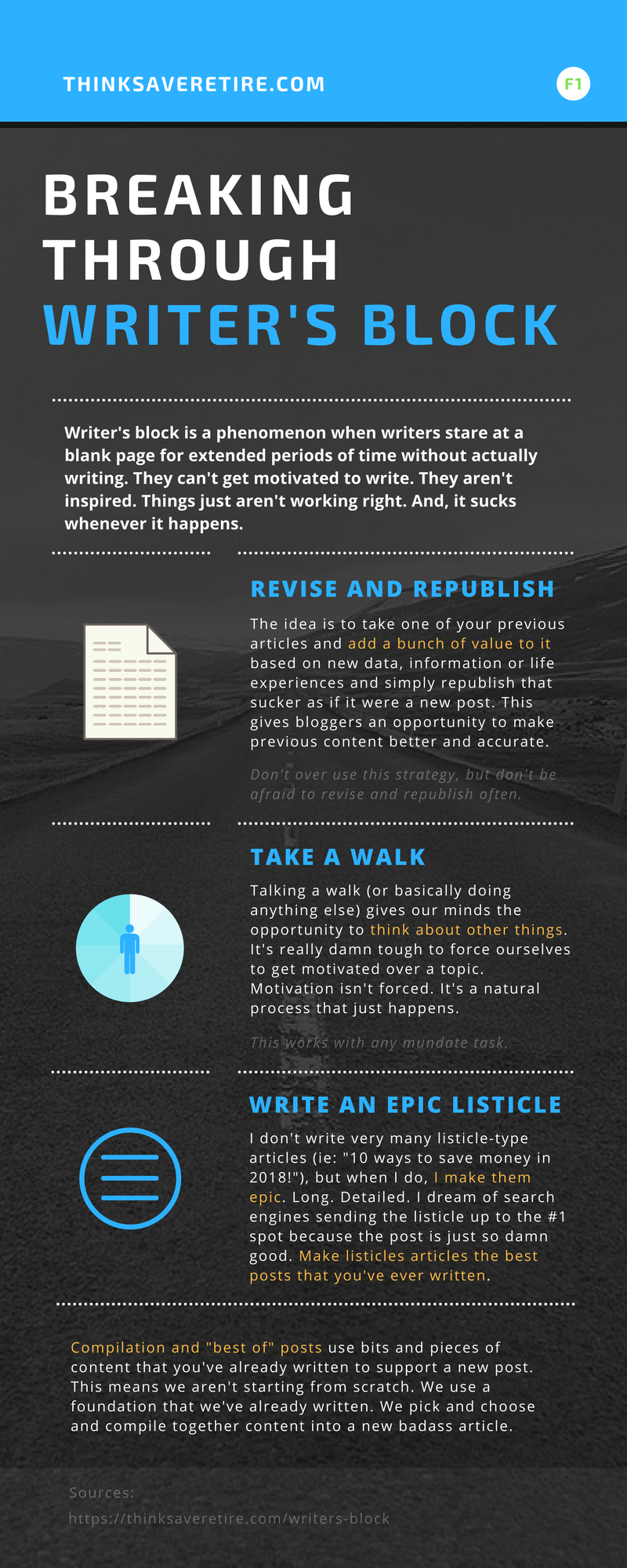How to deal with writer's block and NOT publish crap
Over the past several days, writer's block has plagued my existence. I am motivated to write, but I can't find a topic that excites me to save my life. How can we break out of this writing rut?

Let me tell you about a first world problem that I've dealt with the last several days: I've been super motivated to write, but I can't come up with a topic that excites me enough to sit down and punch some stuff into the computer.
It's been like this for days, and I can't seem to shake it. Not yet, anyway.
If you are a writer, you know what I'm talking about. As writers, there are three primary states that we find ourselves in:
We have a ton to write about but lack the motivation to write. When you first start a blog, this might be the state that you're most familiar with. Or if you're in grade school, this is probably your perpetual state of living.
We have a lot of motivation to write, but can't come up with a topic. This is the state that I'm in right now, and it's bugging the hell out of me.
The perfect storm of the afore-mentioned two: Motivation + Topic. Writing comes naturally. You're blazing through blog posts and nearly every one is damn good. I was swimmin' in this state for the first part of 2018. It seemed like every day I was writing a new post, and they all did super well. I was on fire, and I rode that tidal wave as long as I could.
This year, I've accidentally written posts that quickly became one of my post popular, like Your ultimate guide to being successful, for example. And, my early retirement FAQ post just went bonkers. I was in my prime when writing these posts, enjoying that beautiful perfect storm that writers love so much.
But now, the wave has disappeared. The motivation is there, but the topic isn't. Many of us feel this very same phenomenon from time to time, and the solution involves two different things:
Break out of writer's block and publish something to maintain your publishing schedule that isn't just pure drivel.
How to break writer's block and not publish crap

I've been in this situation before, and it's hell. Truly, hell. I'd rather have a bunch of topics to write about but not have the time or energy to write about them. That definitely sounds like the lesser evil, here. When you have the motivation to write but can't get motivated over a topic, it's like having all this energy to exercise and move around but you're stuck on an uncomfortable airplane with crying kids and the smell of flatulence from the guy in front of you. Heading to your in-laws.
Here's what I do to break this wicked cycle of nothingness but still provide something that can generally be considered, at least loosely, as "value".
Revise and Republish
I'm a hard-core believer in the Revise and Republish strategy and have written about it on the blog. The idea is to take one of your previous articles and add a bunch of value to it based on new data, information or life experiences and simply republish that sucker as if it were a new post. I've done that before on the blog and love it. Not only does it include content that I KNOW readers will enjoy (because they've previously enjoyed said content), but it also gives me the opportunity to NOT start from scratch and still provide something of value to my readers.
One example of a post that I've republished is "The thing that surprised me the most about early retirement". Notice what I put at the very bottom of that article, too. If you republish something, don't be afraid to just come out and say it.
For your edification, I'm going to blatantly steal a few paragraphs from my Revise and Republish article so you don't need to click over to it. However, there's a bunch more detail there if you do!
Why might you want to revise and publish? A few reasons:
1. New details / perspectives / facts / links
Life-changing experiences have profound effects on us humans. They change the way we look at life. They alter our motivations, perspectives, and opinions. As we change, we might want our blog to change with it. If someone stumbles on one of our previous articles, it may include details that are either no longer true or downright misleading. You’re no longer the same person that you once were – and all that.
You may also use this opportunity to create links in older content to some of your newer blog posts, encouraging the user to stick around a bit longer and decreasing your bounce rate. And, decreasing your bounce rate is just gold!
2. You now have a much wider audience
Many of us write some pretty killer shit before our blogs become well-read. Yeah, I’m talking about that post you spent 60 hours writing, full of well-researched facts and figures, graphs, charts and wizard-like insight. The problem? Only 17 people read it because you happened to write that sucker a week after you sent your blog into the digital airwaves. And, five of those people were family. 10 were friends. Yeah, two people actually read that shit.
Man, it sure would be nice for your present-day 10,000 readers to take a gander at that gem, yes?
3. Your older stuff was pure crap
Hard to bring yourself to admit, eh? But, let’s face it – for most of us, it’s true. It certainly was for me. My older blog posts were utter crap compared to what I’m churning out today. Today’s posts are more detailed, better researched and, hopefully, just more interesting to read. But, I’d also like to avoid wasting some of the stuff I wrote years ago. And, I’d like newer readers NOT to stumble onto anything that I’d consider to be…well, crap. Revise and republish allows us an opportunity to un-crappify some of our older stuff.
4. Increase / maintain frequency of posts
If you are struggling to write new content, revising and republishing some of your older stuff could help to keep the posts coming and maintain your blogging schedule. It’s basically free content that you get to publish again. How convenient!
Take a walk
I came up with this post on a walk, in fact! Taking a walk (or basically doing anything else) gives our minds the opportunity to think about other things. It's really damn tough to force ourselves to get motivated over a topic. Motivation isn't forced. It's a natural process that just happens. We can put ourselves in the position to be motivated, but it's hard to force. It's never worked for me.
What does work for me is stop trying to force motivation. Doing something repetitive or monotonous (like walking) frees our minds to start wandering, and this is where true wisdom often finds us. On my walk, I drafted out about half of this post in my head. I was actually excited to get back in front of my computer to start writing again. Imagine that!
Write compilation posts
This one is a bit sneaky, but there's nothing inherently wrong with it, either. Compilation posts are posts that include elements of previous posts. Kinda like what I did above within the "Revise and Republish" section, you're stealing content from your older posts in support of a brand new post. I've done this several times in the past to help lengthen my posts and to save time writing something that I've already spent the time to write.
The goal is to use compiled content to assist in your new article. Crappy posts are simply thrown together using "borrowed" content fraught with mixed voice and references to material that makes no contextual sense in the newer article. Don't produce crappy blog posts.
Instead, use compiled content as a supplement, and read everything that you're stealing from your other material carefully in the context of your new post. Your readers will thank you for it.
Publish an Epic listicle

I don't write very many listicle-type articles (ie: "10 ways to save money in 2018!"), but when I do, I make them epic. Long. Detailed. I dream of search engines sending the listicle up to the #1 spot because the post is just so damn good. Not all dreams come true, but it's awfully nice to have them!
A good example of a listicle is Top 12 influential money bloggers, published a few weeks ago. That 1,600-word post was written to send traffic toward what I consider the most influential bloggers in the industry (not necessarily the biggest or "best" blogs - but the most influential bloggers). I also titled it in the hopes of getting some Google love.
It's already ranking #1 for the search term "influential money bloggers".
Another example is my 48 fresh blogging strategies to increase your blog traffic in 2018. I spent many hours putting this one together, and it turned into a 3,500-word monster. It's the longest post that I've ever written on TSR.
Remember that everybody writes listicles. Make yours better.
Write "best of" posts
I'm not a huge fan of these "best of" posts, but this is still an option. Basically, you're writing a new post with links to some of your best stuff. These posts can work if they're designed cleverly enough. Instead of just posting a bunch of links, add value in some way around those links. Write "best of" posts about a specific topic, and think of that new post as the authoritative source of the very best that you've written on that topic. Make your "best of" post GREAT.
And yes, the stuff that you're linking to actually needs to be good. Don't write "best of" posts that more or less links to everything you've written. Trust me, even the best writers admit that some of their stuff is crap. Not everything you've written is good. Not everything I've written is good either.
If you were your reader, would that "best of" post add value to your life?
I suppose the only "best of"-type post I have is my start here page.
Okay, your turn. What's your most effective strategy for breaking out of writer's block while still maintaining a high-level of quality?